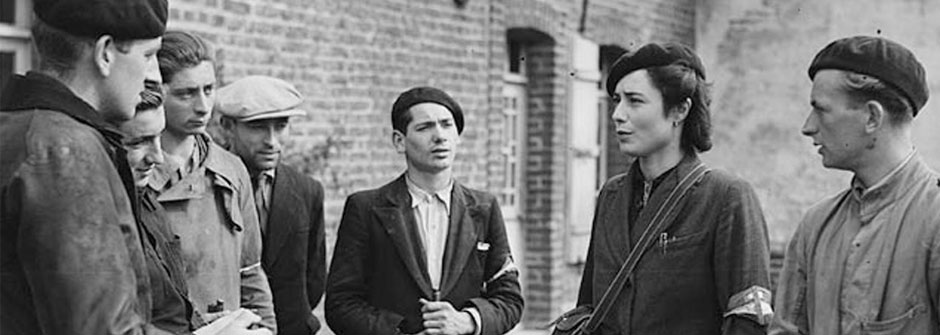
2018 Teachers Study Day
Jews and Resistance in France during World War II
The Jewish-Christian Studies Graduate Program is pleased to invite educators and other interested individuals to the professional development study day, Jews and Resistance in France during World War II.
The study day will offer five professional development credit hours to New Jersey educators.
Monday, March 5, 2018
9:00 a.m. - 3:00 p.m.
Nursing Amphitheatre, Room NU113
Seton Hall University
After the Nazi conquest of France in June 1940, the eastern area of Alsace-Lorraine became part of Germany. Northern France and the Atlantic coast were controlled by the Occupation Forces and the rest was governed from Vichy in collaboration with the Germans. At that time there were 350,000 Jews in France; more than half were not French citizens, having arrived from the East after World War I or from Germany after 1933. At first they were more vulnerable than citizens but from both zones 80,000 Jews were deported in 1942 and later; only 2,000 survived the war. Resistance was organized in both zones by Jews and others. The presenters and participants at this year’s professional development study day will examine what important lessons these stories of resistance can teach our generation today.
Registration:
Admission, including lunch is free, but you must register by February 28, 2018.
To RSVP, simply do one of the following:
- Fill out the form on the right, or
- Call Lawrence Frizzell by phone (973) 761-9751, or
- Email [email protected]
Speaker Bios
Brenda Moore (Th.D., Harvard Divinity School)
Dr. Brenda Moore is Associate Professor of Theology at Fordham University. She is the author of Sacred Dread: Raïssa Maritain, the Allure of Suffering, and the French Catholic Revival 1905-1945 (Notre Dame, 2013) and the forthcoming book, One Flame Kindles Another: Spiritual Friendship and Religious Difference at the Edges of Catholic Europe (1920-1960). Dr. Moore regularly teaches courses on Catholic engagements with Jews and Judaism, particularly during the Shoah and the years leading up to Vatican II, and on other topics including religion and gender, mysticism and politics, and Catholicism and modernity.
Michel Jeifa (M.B.A., New York University)
Mr. Michel Jeifa was born in 1927 in Paris, France. He was educated in Lycee and received a Bachelor’s degree in 1945. Following the liberation of France, Mr. Jeifa came to the U.S. in 1947 with his sister and her two children. Mr. Jeifa then went on to build his life in the U.S. During this period, he also served in the U.S. Army from 1951 to 1953. Following the completion of his military service he went on to a distinguished career at the Home Insurance Company in New York (1953 to 1994) – retiring after 41 years of exemplary service, as an Assistant Vice President in 1994. Since retirement, Mr. Jeifa enjoys life with his wife of 62 years, Blanche Jeifa, in Florida. He has two children and five adult grandchildren – all witness to the deep significance of his survival.
Gisele Joachim (B.A., SUNY Oneonta; Graduate coursework, Marist College)
Ms. Gisele Joachim is currently the Dean of Enrollment Management at Seton Hall University School of Law. In this role she is responsible for all aspects of admissions and recruitment at the Law School. Prior to arriving at Seton Hall in 2004, Ms. Joachim served in Financial Aid, Admissions and Student Services positions in the State of New Jersey. She lives in New Jersey and is married with 2 adult children.
Michele Dahl (Ed.D., University of St. Thomas)
Dr. Michele Dahl is the Religion Coordinator and Campus Ministry Facilitator for the Lower School at Oak Knoll School of the Holy Child in Summit, NJ. Her doctoral dissertation, Middle School Application of Holocaust Studies: Catholic Students Adopt Survivors: A Case Study, was related to her experience in the classroom. Dr. Dahl’s visit to Le Chambon-sur-Lignon with Mr. Paul Kutner (see below) enables them to present the heroism of these French Protestant villagers as an important example of resistance to the Nazis during World War II.
Paul Kutner (B.S. in Foreign Service, Georgetown University)
Mr. Paul Kutner is Chair of the World Language Department and Director of Global Learning at Oak Knoll School of the Holy Child in Summit, NJ. In 2012 he was the recipient of a grant from the French Embassy in the United States that was the catalyst to his research on how to teach about World War II in French class. From there, Mr. Kutner started researching the Righteous of Le Chambon-sur-Lignon and Dieulefit, in addition to the horrors of the Roundup of the Vélodrome d’Hiver (Vél d'Hiv). He has amassed over forty hours of testimony that he uses in class, and his interview with Joseph Weismann, a child survivor of the Vél d'Hiv, is part of the United States Holocaust Memorial Museum online archives.
